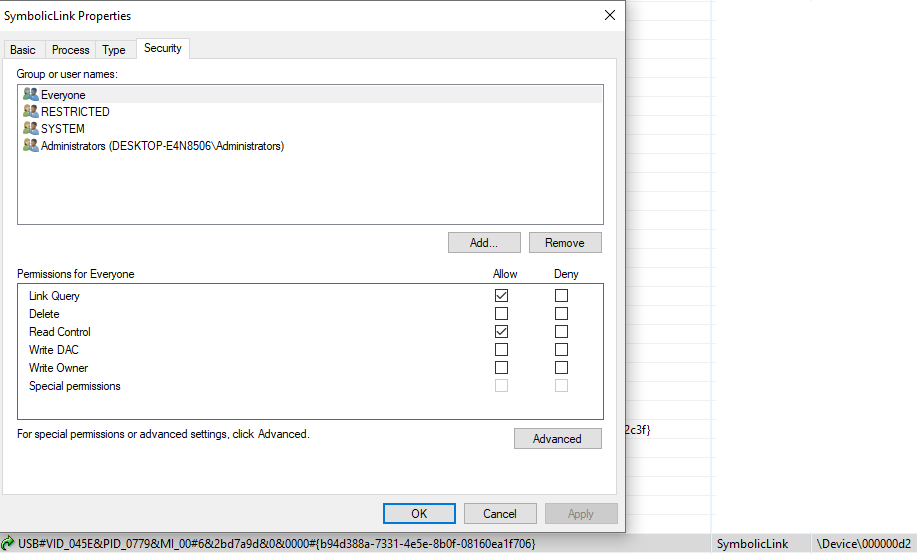I’m trying to obtain a handle to my USB WebCam (Microsoft LifeCam HD-3000 ) device. I dont want to use it in a conventional way so usage of any multimedia framework are not considerable. I need to be able (if possible) to send to it IRP’s via DeviceIoControl etc. Reversing its driver written in KMDF I found a call to WdfDeviceCreateDeviceInterface and GUID passed as an argument:
Pseudo-code
__int64 __fastcall EvtDeviceAdd(__int64 wdfDriver, __int64 DeviceInit)
{
WdfFdoInitSetFilter(WdfDriverGlobals, DeviceInit);
WdfDeviceInitSetDeviceType(WdfDriverGlobals, DeviceInit, 0x23i64);// FILE_DEVICE_VIDEO
WdfDeviceInitSetIoType(WdfDriverGlobals, DeviceInit, 3i64);// WdfDeviceIoDirect
memset(&fdoAttributes, 0, 0x38ui64);
fdoAttributes.ContextTypeInfo = (PVOID)off_FFFFF80765075020;
fdoAttributes.Size = 56;
fdoAttributes.ExecutionLevel = 1;
fdoAttributes.SynchronizationScope = 1;
WdfDeviceInitSetIoInCallerContextCallback(WdfDriverGlobals, DeviceInit, EvtIoInCallerContext);
v1 = WdfDeviceCreate(WdfDriverGlobals, &DeviceInit, &fdoAttributes, &device);// WdfDeviceCreate
v1 = WdfDeviceCreateDeviceInterface(WdfDriverGlobals, device, &stru_FFFFF807650740C8, 0i64);
return (unsigned int)v1;
}
.rdata:FFFFF807650740C8 stru_FFFFF807650740C8 dd 0B94D388Ah ; Data1
.rdata:FFFFF807650740C8 ; DATA XREF: internalEvtDeviceAdd+351↓o
.rdata:FFFFF807650740C8 dw 7331h ; Data2
.rdata:FFFFF807650740C8 dw 4E5Eh ; Data3
.rdata:FFFFF807650740C8 db 8Bh, 0Fh, 8, 16h, 0Eh, 0A1h, 0F7h, 6; Data4
Python>getGUID(0xFFFFF807650740C8)
b94d388a-7331-4e5e-8b0f-08160ea1f706
Having an interface GUID I used the WinObjEx64 to find a symlink to created device:
With symlink I attempted to open a handle:
int main()
{
LPWSTR errormsg = NULL;
DWORD errorCode;
HANDLE h = CreateFile(L"\\\\.\\USB#VID_045E&PID_0779&MI_00#6&2bd7a9d&0&0000#{b94d388a-7331-4e5e-8b0f-08160ea1f706}",
GENERIC_READ, // Only read access
0, // FILE_SHARE_READ | FILE_SHARE_WRITE
NULL, // no SECURITY_ATTRIBUTES structure
OPEN_EXISTING,// No special create flags
0, // No special attributes
NULL); // No template file
errorCode = GetLastError();
printf("Error code: 0x%x\n", errorCode);
if (h == INVALID_HANDLE_VALUE)
{
FormatMessageW(
FORMAT_MESSAGE_ALLOCATE_BUFFER |
FORMAT_MESSAGE_FROM_SYSTEM |
FORMAT_MESSAGE_IGNORE_INSERTS,
0,
errorCode,
MAKELANGID(LANG_NEUTRAL, SUBLANG_DEFAULT),
(LPWSTR)&errormsg,
0, NULL);
wprintf(L"Error : %s\n", errormsg);
}
return 0;
}
Output:
Error code: 0x2
Error : The system cannot find the file specified.
With such result I decided to obtain a dev path using SetupDi* APIs
void GetInterfaceDevicePath(GUID* guid) {
DWORD requiredSize;
int MemberIdx = 0;
HDEVINFO hDeviceInfoset = SetupDiGetClassDevs(guid, NULL, 0, DIGCF_DEVICEINTERFACE | DIGCF_PRESENT);
if (hDeviceInfoset != INVALID_HANDLE_VALUE) {
SP_DEVICE_INTERFACE_DATA DeviceInterfaceData = { 0 };
DeviceInterfaceData.cbSize = sizeof(SP_DEVICE_INTERFACE_DATA);
while (SetupDiEnumDeviceInterfaces(hDeviceInfoset, NULL, guid, MemberIdx, &DeviceInterfaceData)) {
MemberIdx++;
SP_DEVINFO_DATA DeviceInfoData = { 0 };
DeviceInfoData.cbSize = sizeof(SP_DEVINFO_DATA);
SetupDiGetDeviceInterfaceDetail(hDeviceInfoset, &DeviceInterfaceData, NULL, 0, &requiredSize, NULL);
SP_DEVICE_INTERFACE_DETAIL_DATA* DevIntfDetailData = (SP_DEVICE_INTERFACE_DETAIL_DATA*)HeapAlloc(GetProcessHeap(), HEAP_ZERO_MEMORY,
requiredSize);
DevIntfDetailData->cbSize = sizeof(SP_DEVICE_INTERFACE_DETAIL_DATA);
if (SetupDiGetDeviceInterfaceDetail(hDeviceInfoset, &DeviceInterfaceData,
DevIntfDetailData, requiredSize, &requiredSize, &DeviceInfoData)) {
printf("DevicePath: %S\n", (TCHAR*)DevIntfDetailData->DevicePath);
HANDLE h = CreateFileW(DevIntfDetailData->DevicePath,
0,
0,
NULL,
OPEN_EXISTING,
0,
NULL);
LPWSTR errormsg = NULL;
DWORD error = GetLastError();
printf("Error code: 0x%x\n", error);
if (h == INVALID_HANDLE_VALUE)
{
FormatMessageW(
FORMAT_MESSAGE_ALLOCATE_BUFFER |
FORMAT_MESSAGE_FROM_SYSTEM |
FORMAT_MESSAGE_IGNORE_INSERTS,
0,
error,
MAKELANGID(LANG_NEUTRAL, SUBLANG_DEFAULT),
(LPWSTR)&errormsg,
0, NULL);
wprintf(L"Error : %s\n", errormsg);
}
}
HeapFree(GetProcessHeap(), 0, DevIntfDetailData);
}
SetupDiDestroyDeviceInfoList(hDeviceInfoset);
}
}
int main()
{
GUID deviceGUID;
CLSIDFromString(L"{b94d388a-7331-4e5e-8b0f-08160ea1f706}", (LPCLSID)&deviceGUID);
GetInterfaceDevicePath(&deviceGUID);
return 0;
}
Unfortunately that also failed:
DevicePath: \\?\usb#vid_045e&pid_0779&mi_00#6&2bd7a9d&0&0000#{b94d388a-7331-4e5e-8b0f-08160ea1f706}
Error code: 0x2
Error : The system cannot find the file specified.
Output from livekd about how this driver is attached to the driver/device stack:
||1:lkd> !drvobj \Driver\LifeCamTrueColor
Driver object (ffffc60eba506750) is for:
\Driver\LifeCamTrueColor
Driver Extension List: (id , addr)
(fffff80684f87330 ffffc60eb19f75f0)
Device Object list:
ffffc60eb82f54e0
||1:lkd> !devobj ffffc60eb82f54e0
Device object (ffffc60eb82f54e0) is for:
\Driver\LifeCamTrueColor DriverObject ffffc60eba506750
Current Irp 00000000 RefCount 0 Type 0000002f Flags 00002000
SecurityDescriptor ffffdb888d07e660 DevExt ffffc60ec0deffb0 DevObjExt ffffc60eb82f5658
ExtensionFlags (0000000000)
Characteristics (0x00000100) FILE_DEVICE_SECURE_OPEN
AttachedDevice (Upper) ffffc60eaba48b40 \Driver\ksthunk
AttachedTo (Lower) ffffc60ec2cdadf0 \Driver\usbvideo
Device queue is not busy.
||1:lkd> !drvobj \Driver\usbvideo
Driver object (ffffc60ebfde7e30) is for:
\Driver\usbvideo
Driver Extension List: (id , addr)
(fffff8069aa2d130 ffffc60eb19f7560)
Device Object list:
ffffc60ec2cdadf0
||1:lkd> !devobj ffffc60ec2cdadf0
Device object (ffffc60ec2cdadf0) is for:
\Driver\usbvideo DriverObject ffffc60ebfde7e30
Current Irp 00000000 RefCount 0 Type 0000002f Flags 00002000
SecurityDescriptor ffffdb888d07e660 DevExt ffffc60ec2cdaf60 DevObjExt ffffc60ec2cdaf68
ExtensionFlags (0000000000)
Characteristics (0x00000100) FILE_DEVICE_SECURE_OPEN
AttachedDevice (Upper) ffffc60eb82f54e0 \Driver\LifeCamTrueColor
AttachedTo (Lower) ffffc60eb60e60a0 \Driver\usbccgp
Device queue is not busy.
||1:lkd> !drvobj \Driver\ksthunk
Driver object (ffffc60ea7777df0) is for:
\Driver\ksthunk
Driver Extension List: (id , addr)
(fffff806993f80a0 ffffc60ea772e580)
Device Object list:
ffffc60eaf67c7b0 ffffc60eaba48b40 ffffc60ea7bc4e10 ffffc60ea79a8e00
ffffc60ea7a15de0 ffffc60ea771bdf0
||1:lkd> !devobj ffffc60eaba48b40
Device object (ffffc60eaba48b40) is for:
000000d4 \Driver\ksthunk DriverObject ffffc60ea7777df0
Current Irp 00000000 RefCount 0 Type 0000002f Flags 00002040
SecurityDescriptor ffffdb888d07e660 DevExt ffffc60eaba48c90 DevObjExt ffffc60eaba48c98
ExtensionFlags (0000000000)
Characteristics (0x00000100) FILE_DEVICE_SECURE_OPEN
AttachedTo (Lower) ffffc60eb82f54e0 \Driver\LifeCamTrueColor
Device queue is not busy.
Also a screens from DeviceTree :


Thanks!
